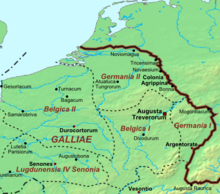| Burgundian revolt of Gundohar | |||||||
|---|---|---|---|---|---|---|---|
| Part of the Fall of the Roman Empire and Roman–Germanic Wars | |||||||
 | |||||||
| |||||||
| Belligerents | |||||||
| Western Roman Empire | Burgundians | ||||||
| Commanders and leaders | |||||||
| Flavius Aetius | Gunther | ||||||
The Burgundian Revolt of Gunther was a revolt of the Burgundian foederati in the Western Roman Empire during the reign of Emperor Valentinian III.[1] The uprising took place in the Gallic province of Germania Prima and was led by the King of the Burgundian Gunther, his main opponent was General Aetius.
In military terms there were two uprisings. The first rebellion was suppressed by Aëtius after its outbreak in 435, but flared up again the following year and was then ended with the death of Gundohar and the bloody suppression of the rebellion.[2] The events associated with these insurrections became the subject of a medieval hero legend that was later integrated into the epic Nibelungenlied, the source of inspiration for Richard Wagner's opera cycle Der Ring des Nibelungen.
The history of this war is briefly narrated, the main sources are Prosper of Aquitaine (390-455) a Christian Roman writer and Hydatius (400-469), Bishop of Chaves. Others useful contemporary are Sidonius Apollinaris (430-486) and the unnamed Gallic chronicle of 452. The reasons for the uprisings have never been reported and the answer to this are given by later historians.